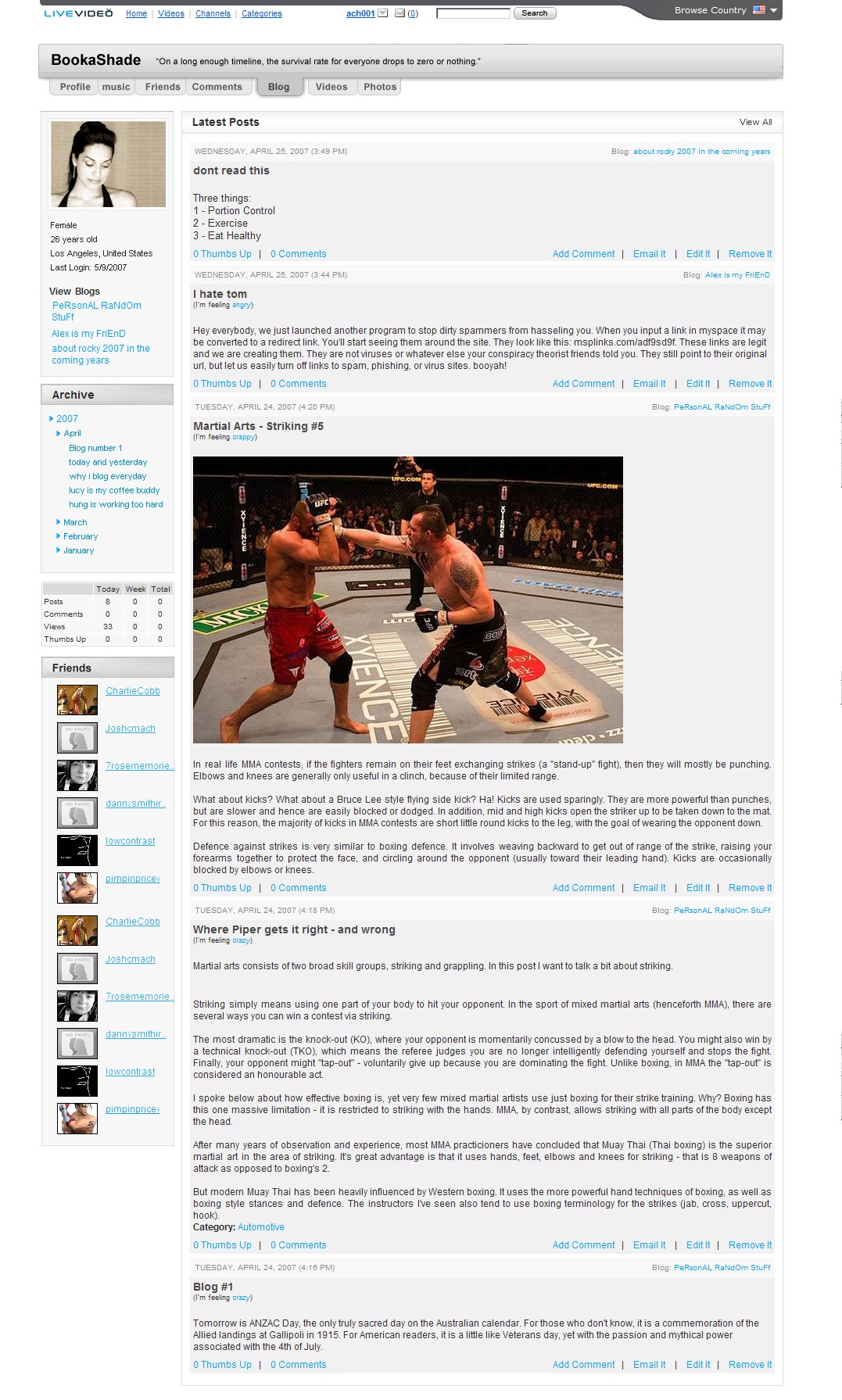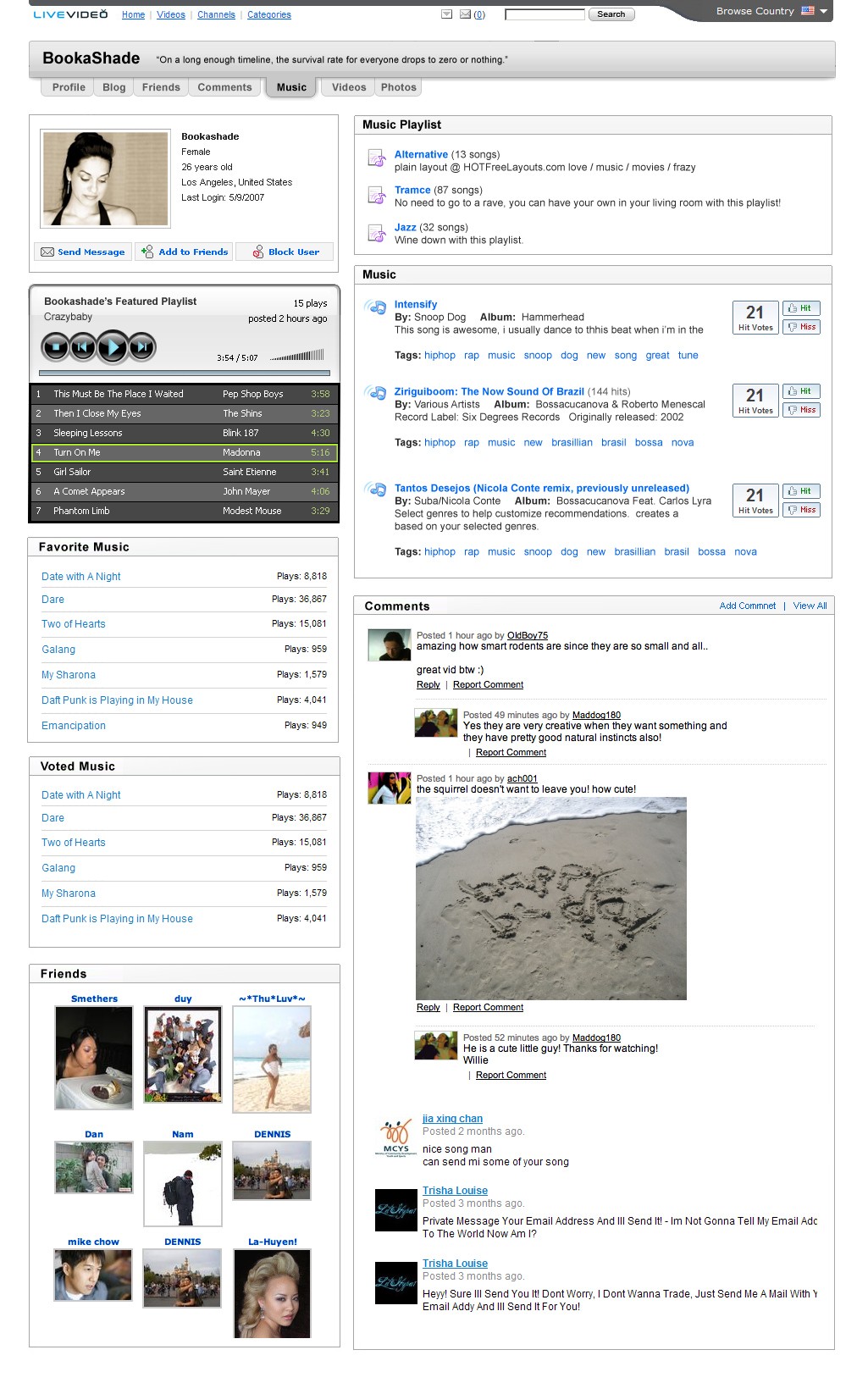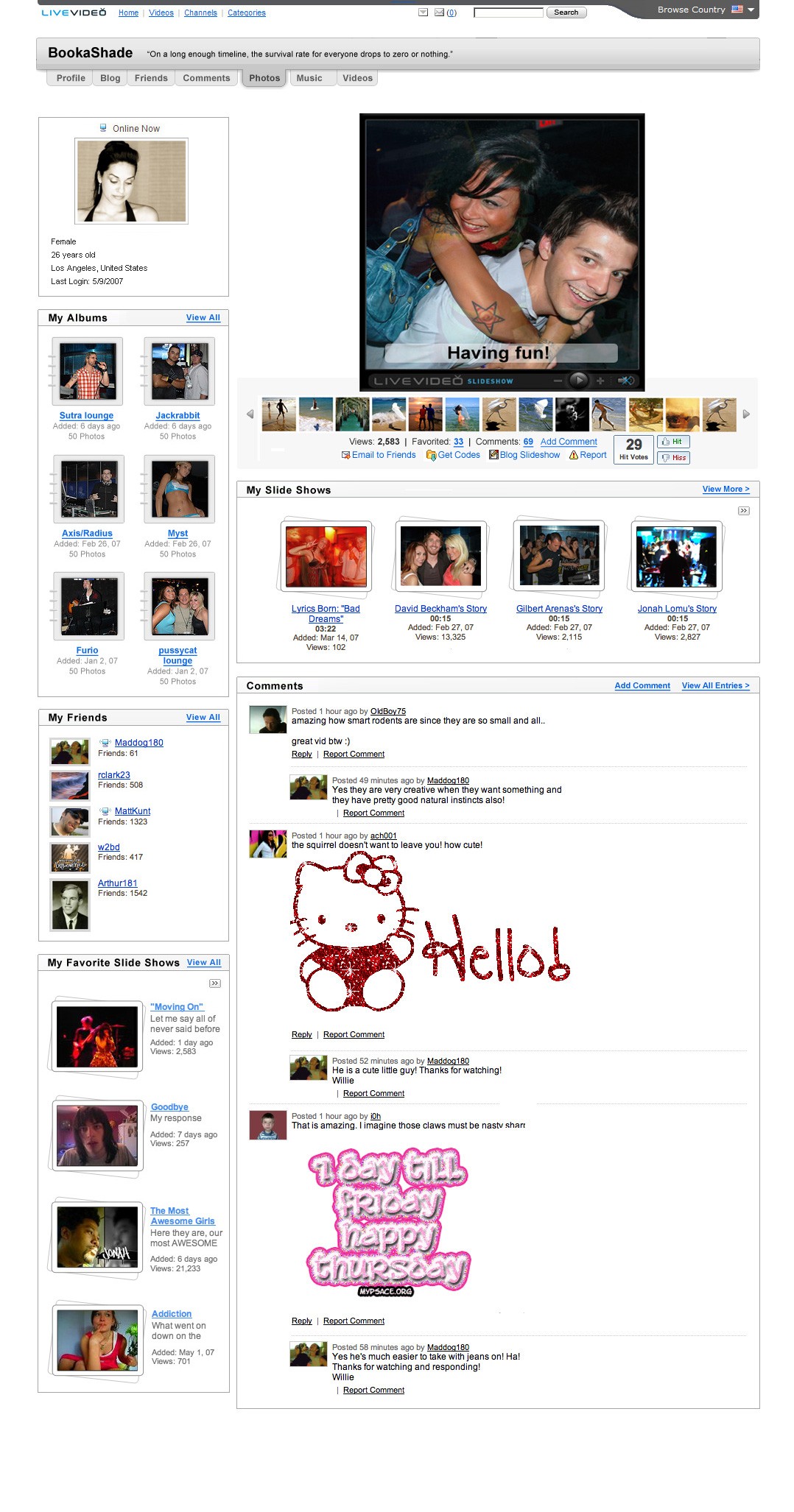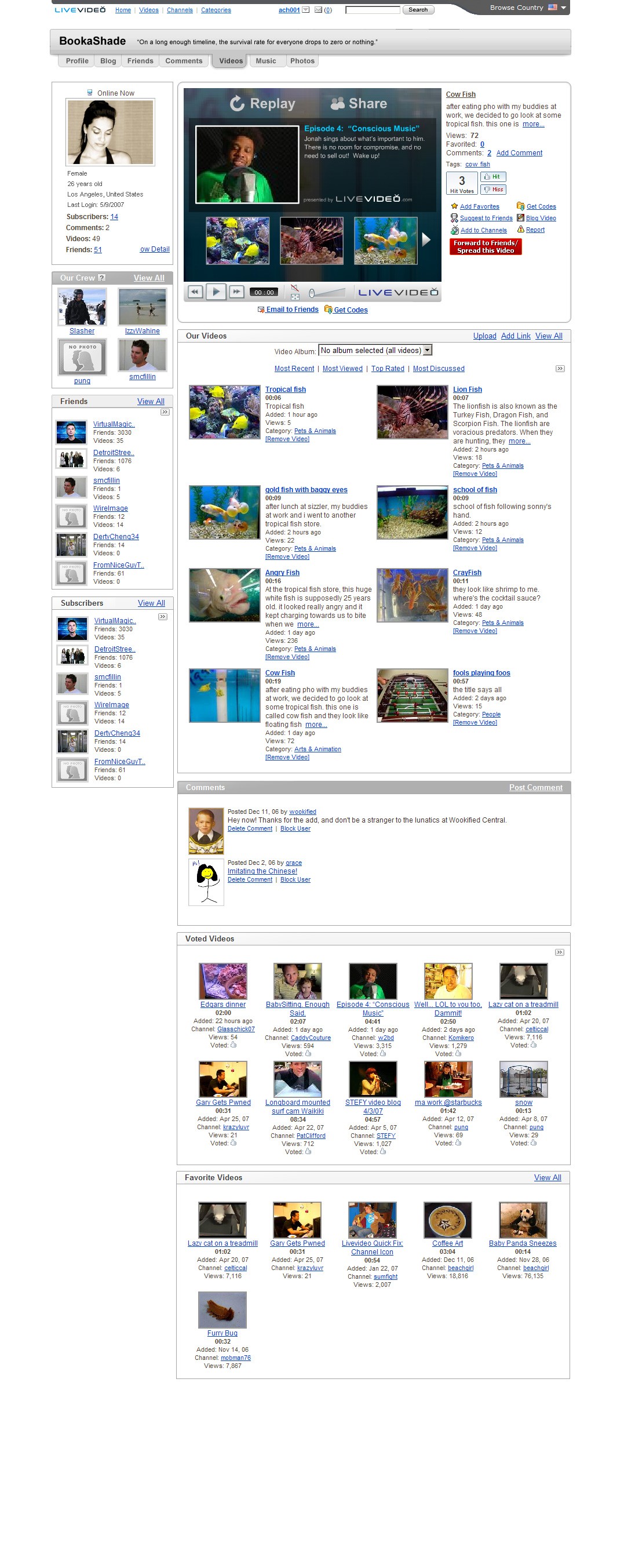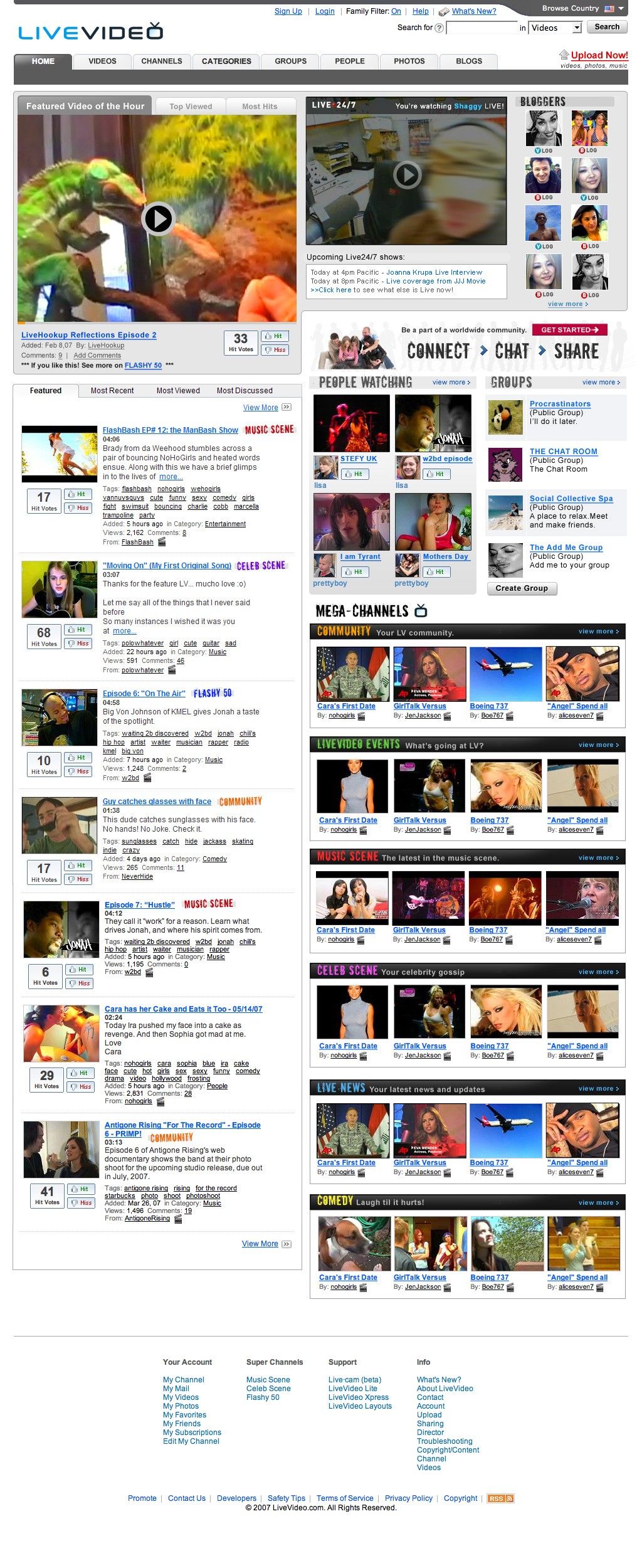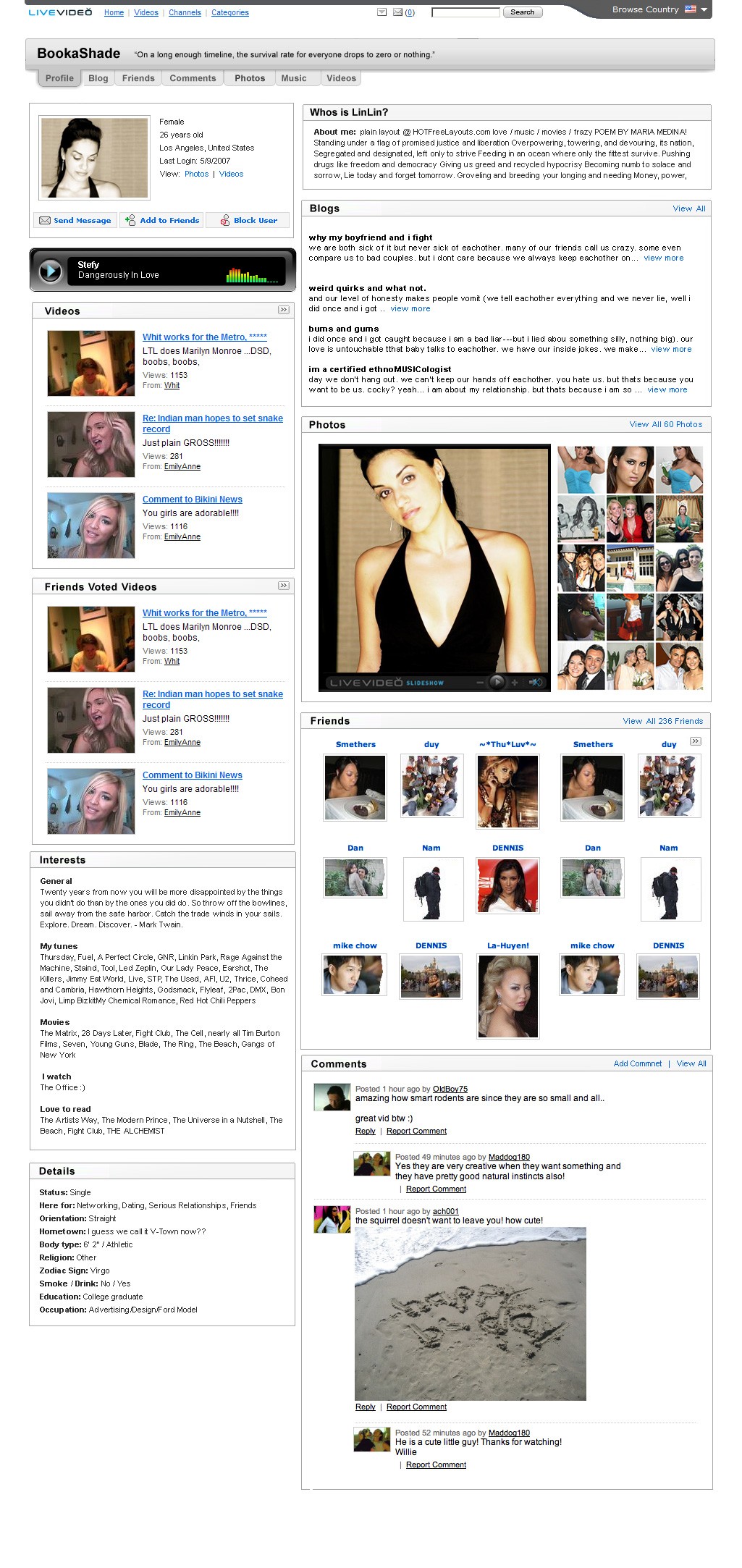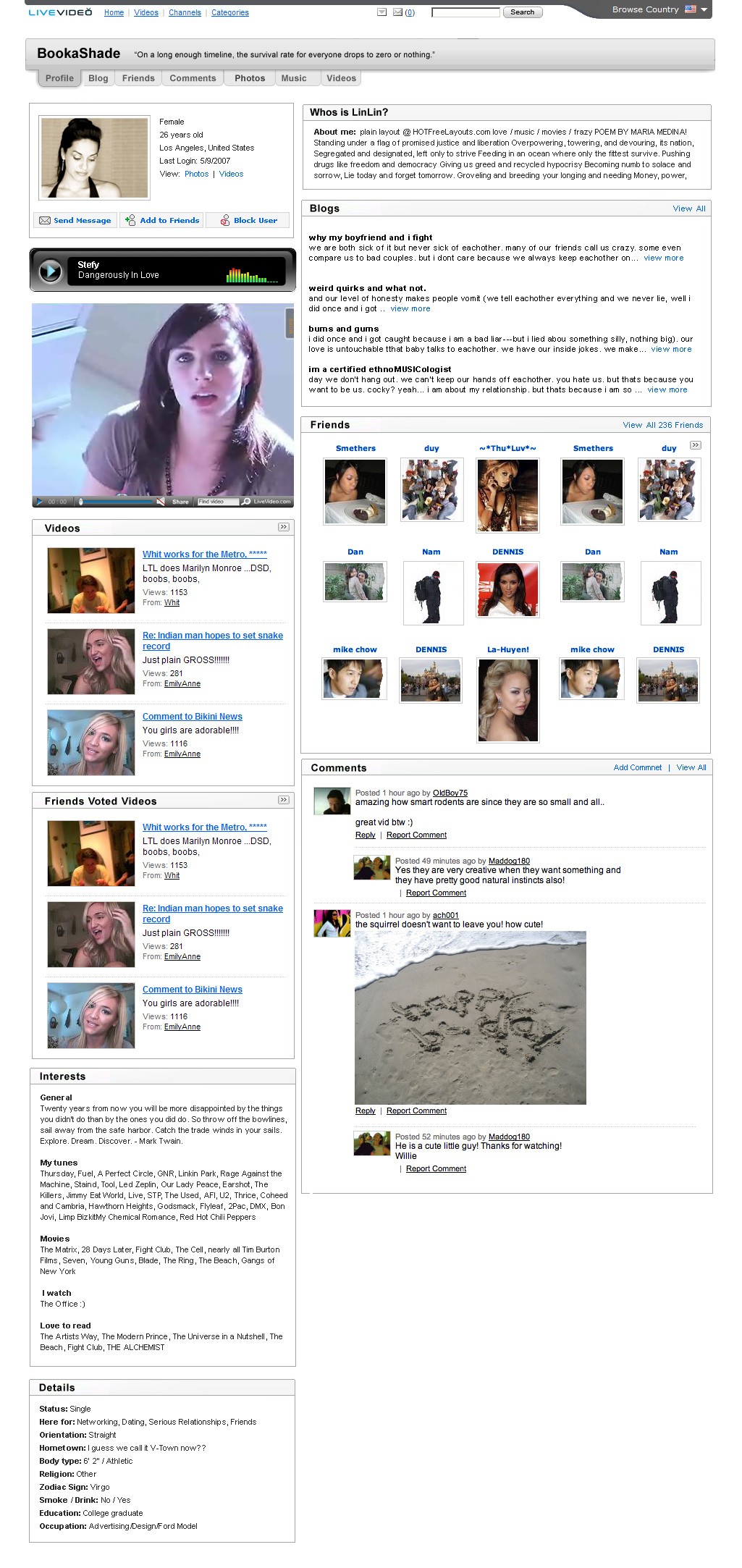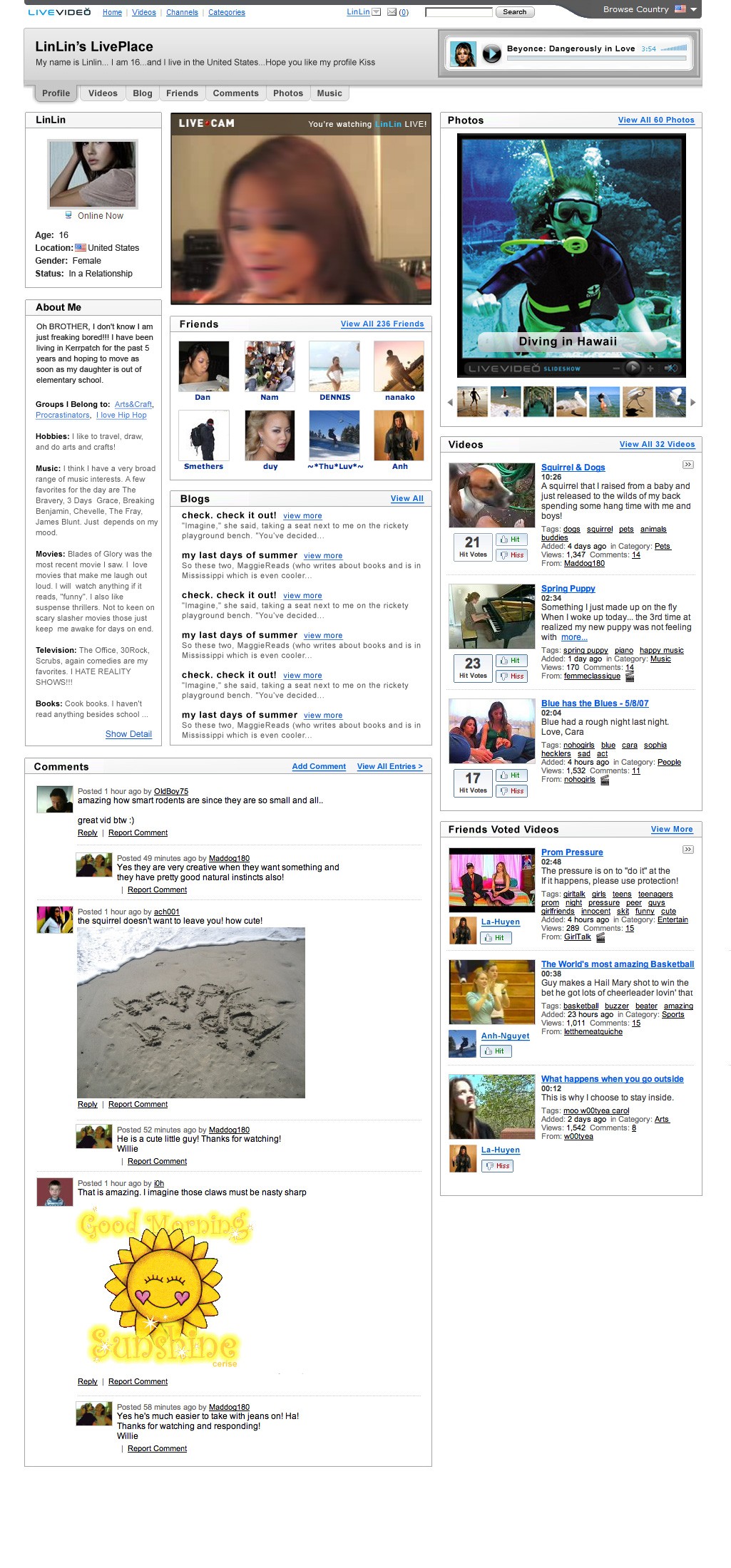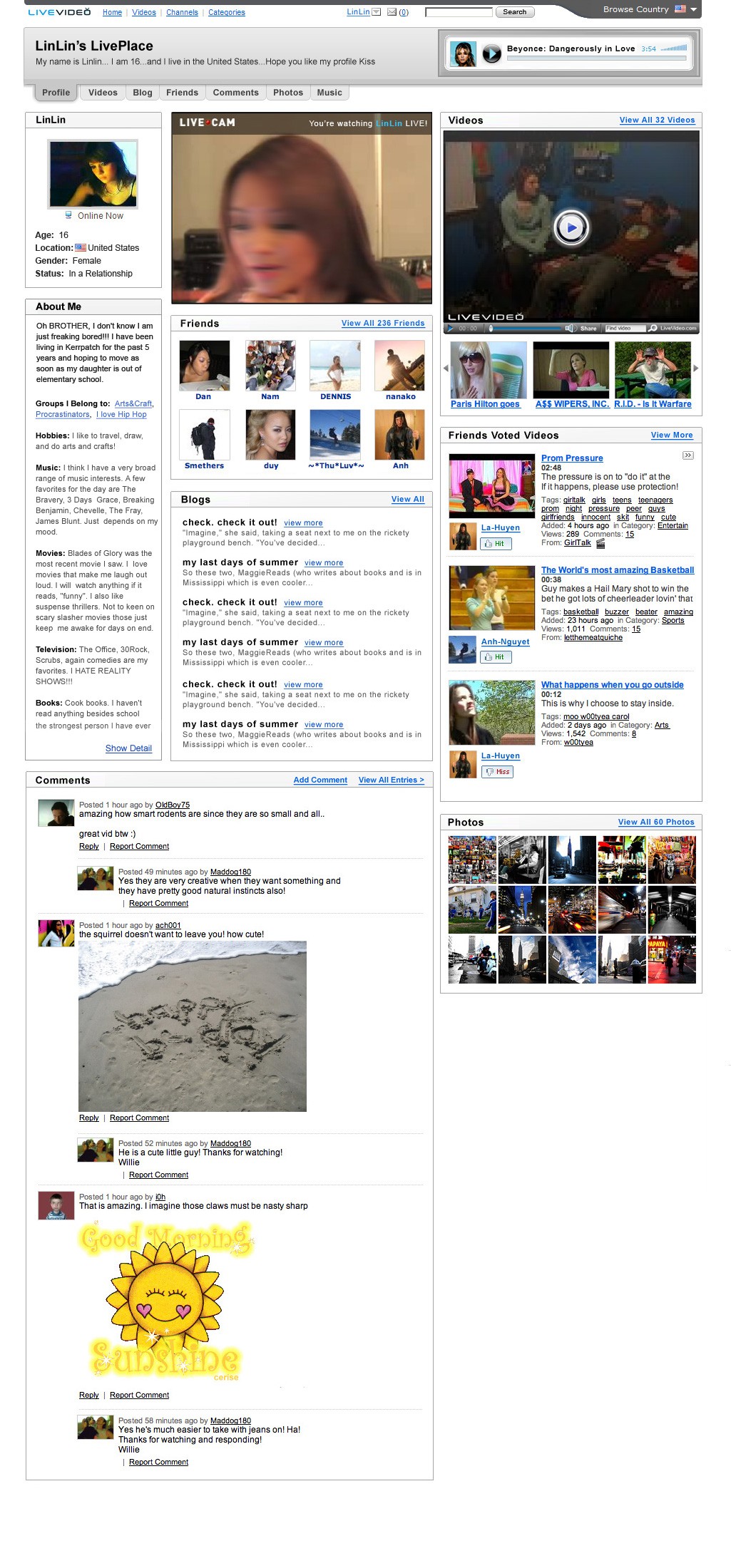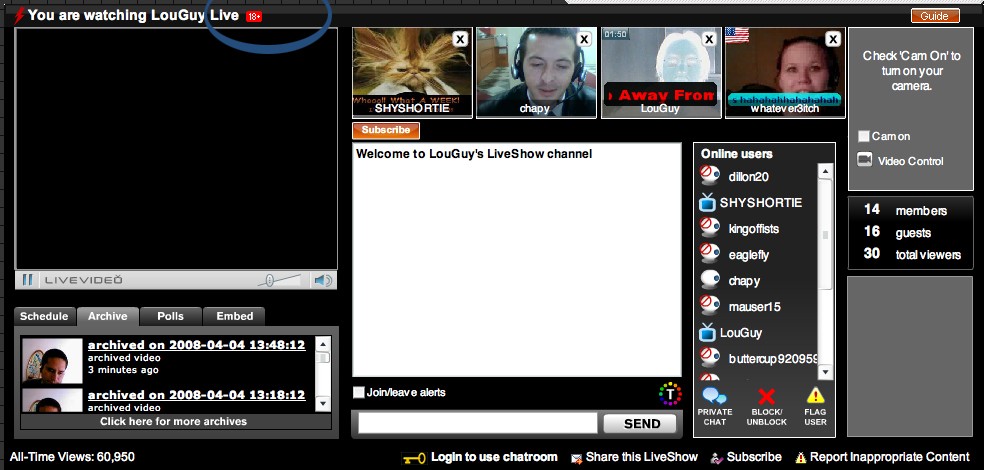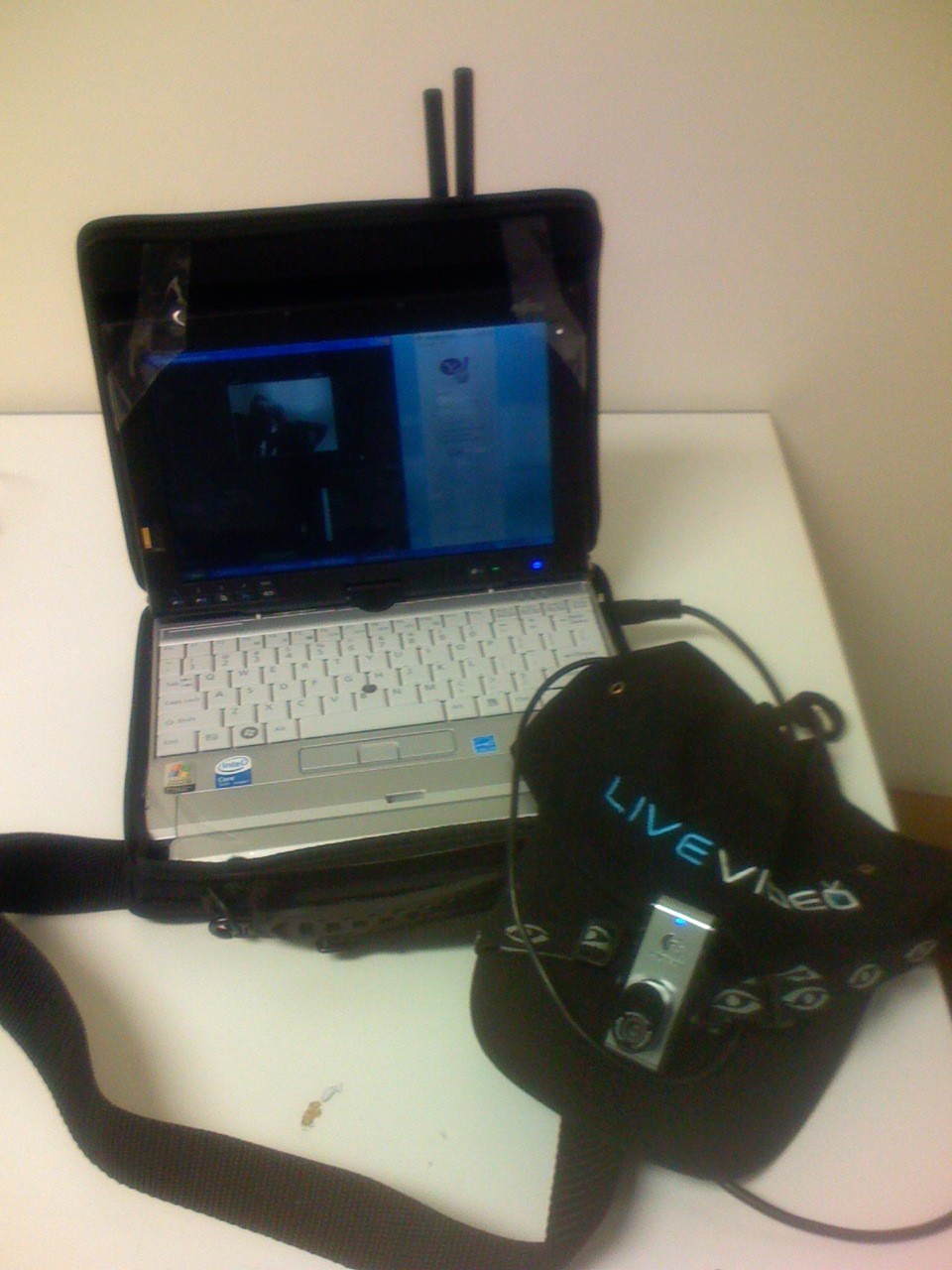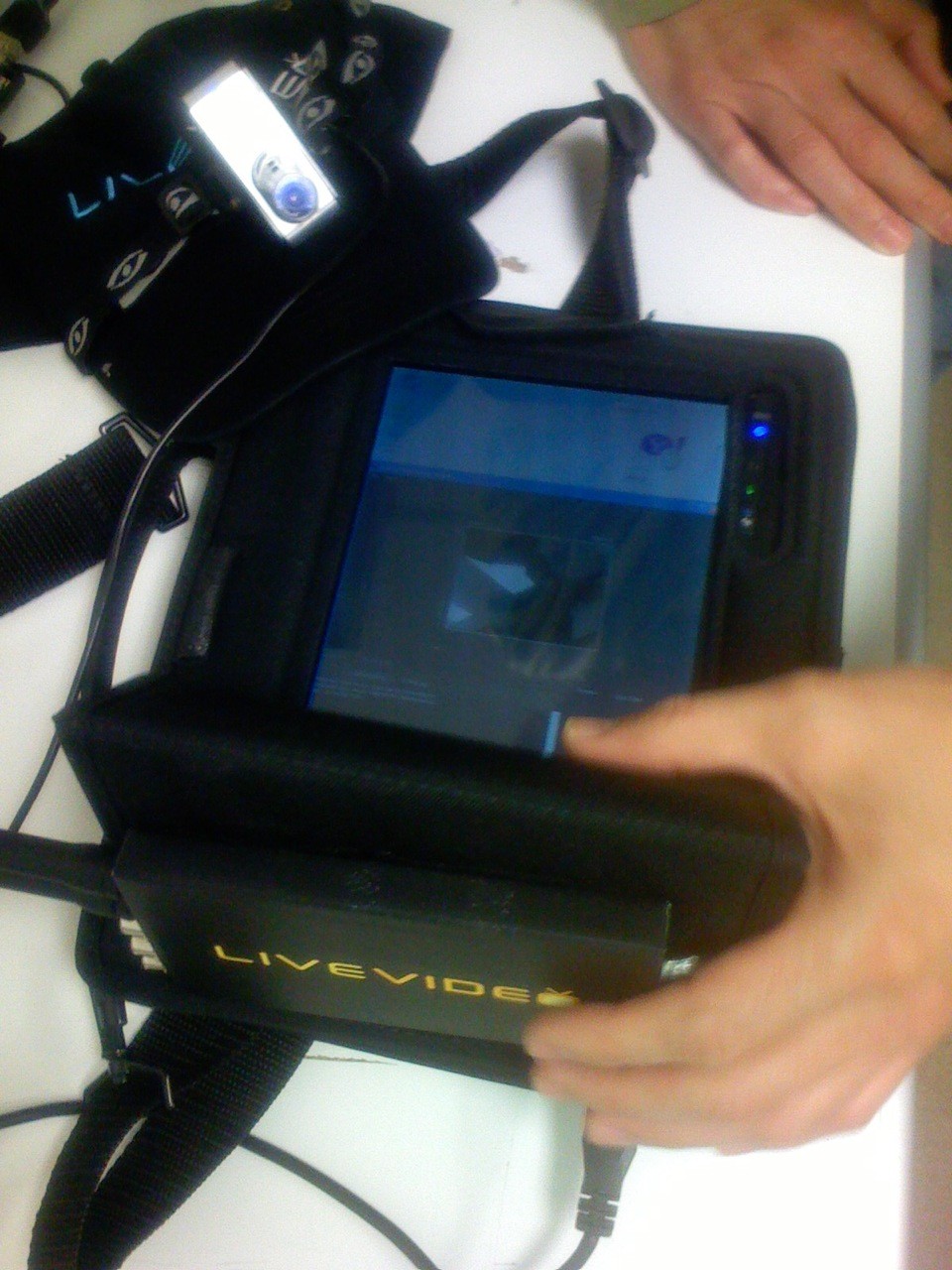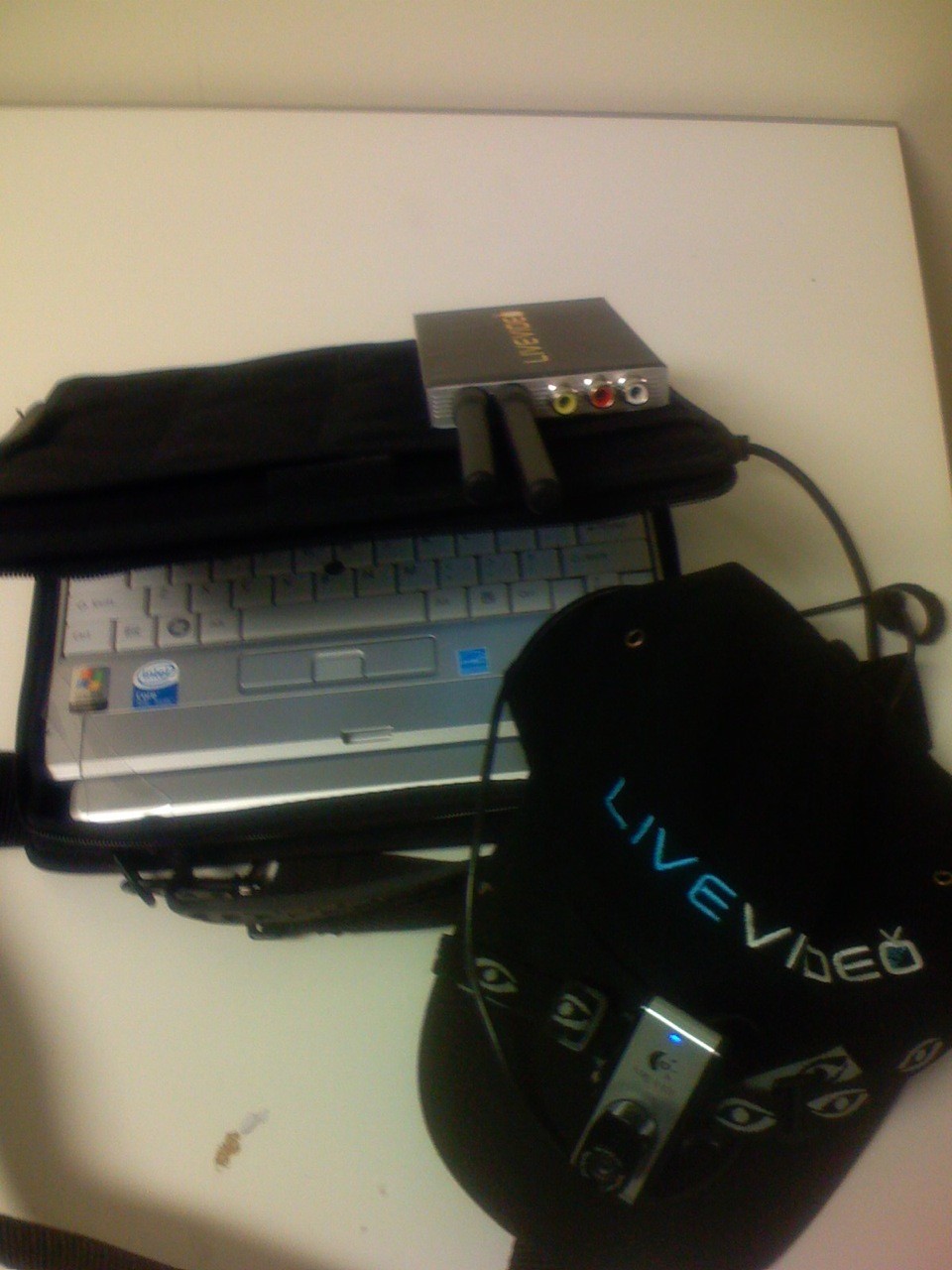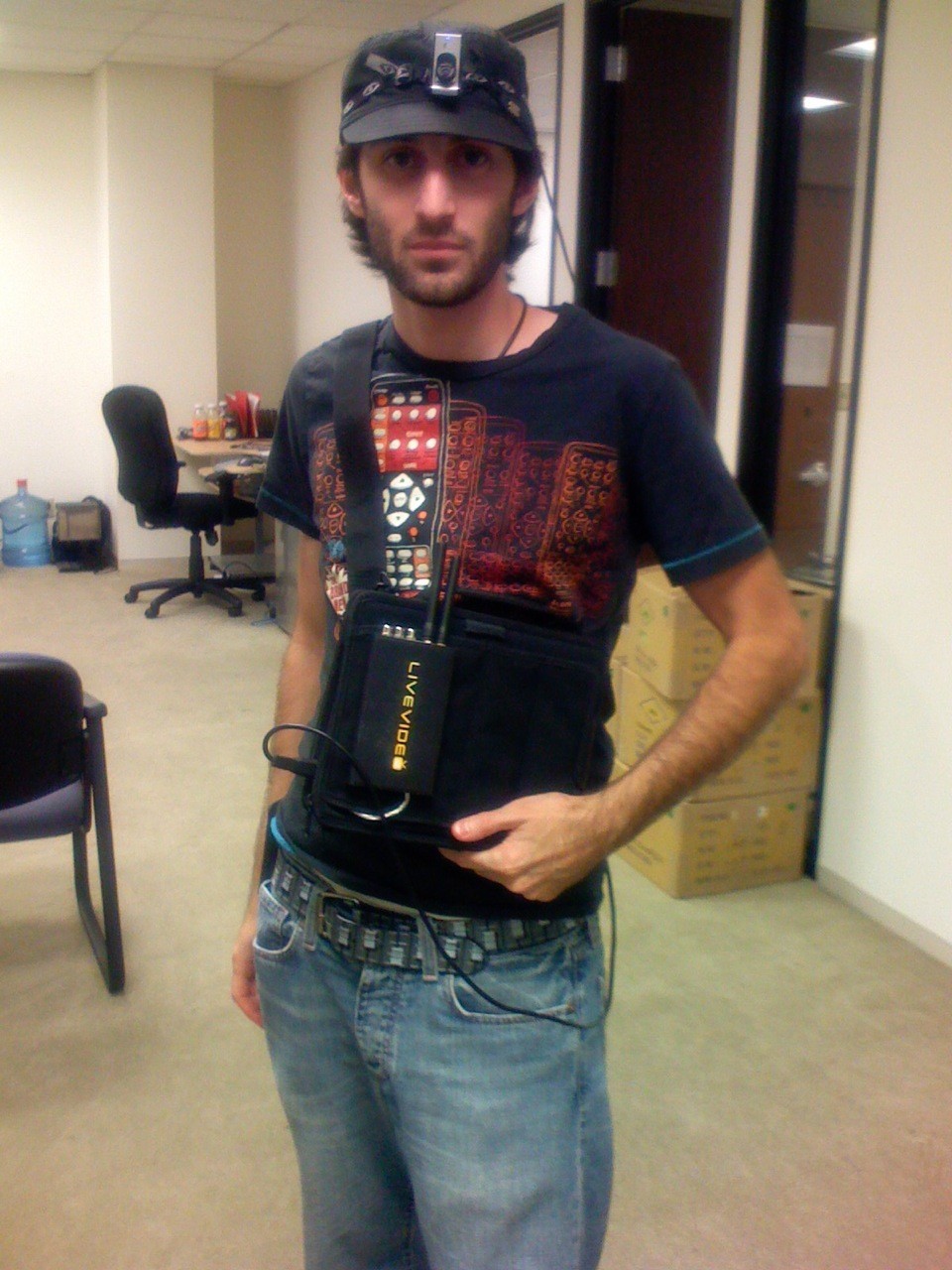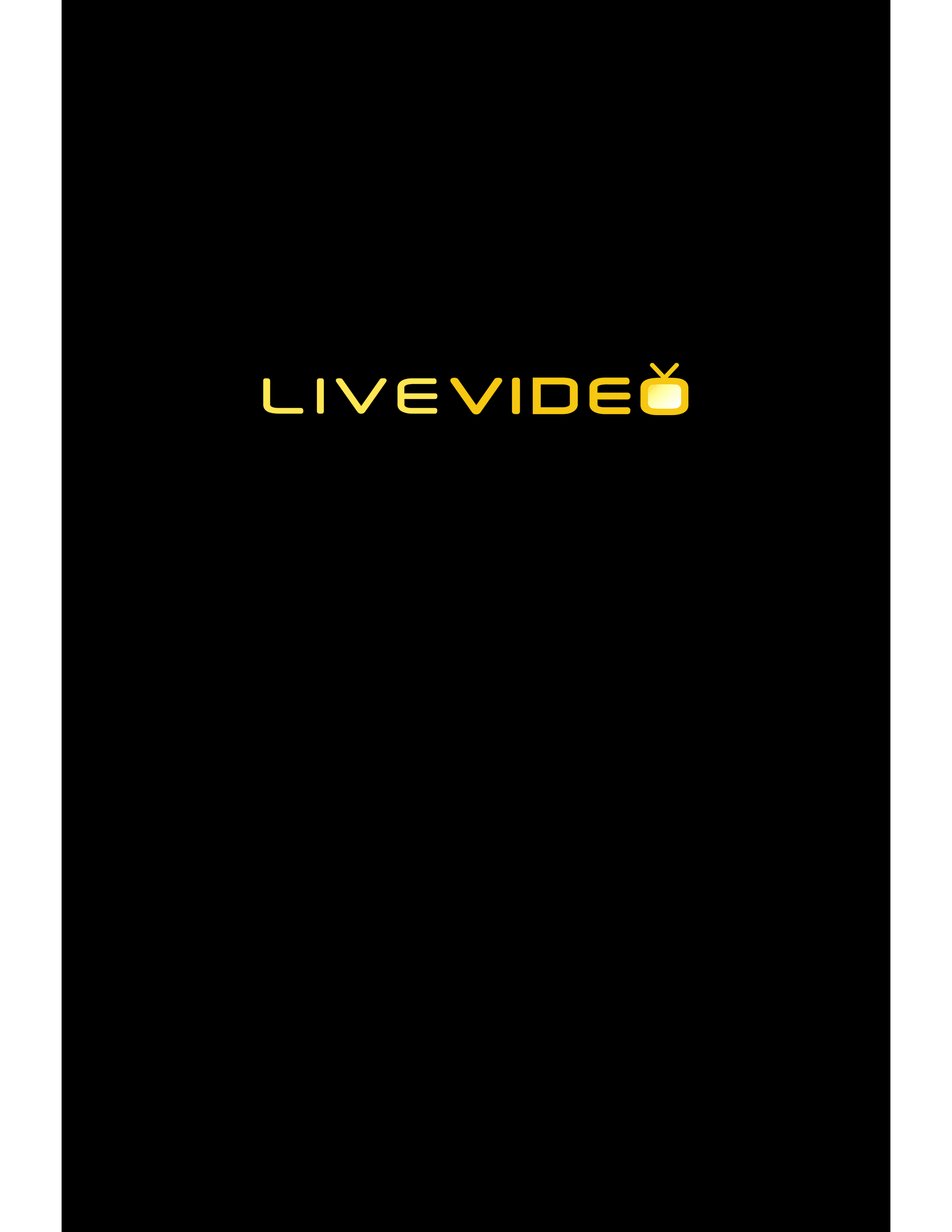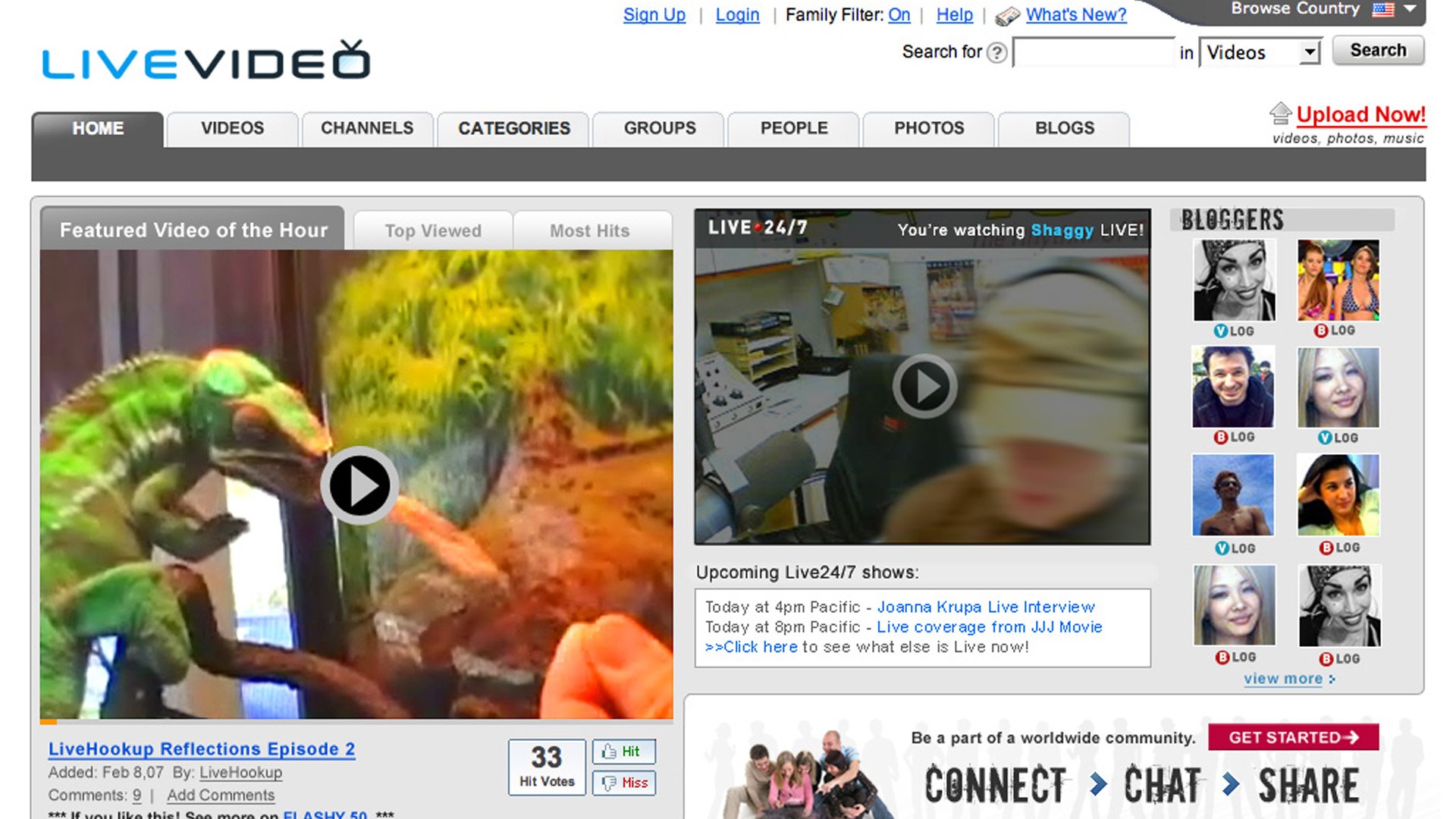
Learn how Google kills competition through anti-competitive behavior. This is the true story of how I tried to compete with YouTube and Google with two of the former founders of Myspace between 2006-2008 on a startup called LiveVideo.com.
Some old files I found related to LiveVideo.com:
Automated Transcript:
00:05 You know, I should be a multimillionaire right now like we should have been what YouTube is today or at least a major competitor of YouTube and we should be a multibillion dollar Unicorn Tech Company. And the only reason we’re not is because of anti competitive behavior from Google. When I hear or see people on the internet make the argument like, oh, just go create your own YouTube, go build your own platform. Well, I did. I literally did. I created my own alternative to YouTube. I did it with Brad Greenspan. I did it with Toan Nguyen who is one of the original architects of Myspace. I literally worked with a team of nearly a hundred people to try and create a competitor to YouTube and YouTube and Google dismantled our entire organization and made us uninvestible and killed our company. From what I understand and what I was told is Google was cutting checks to live video users who has affected from YouTube and paid them to go back to YouTube with any year. Most of our network was delisted off Google
01:25 Welcome to Techpost. I’m your host Trent Lapinski in this episode, I talk about my past experience running a YouTube competitor back in 2006 through 2008, I worked for a company called live video.call. And we were actually bigger than YouTube at the time when all this happened. And this is a story that I’ve waited 11 years to tell you. It is a story about how Google’s anti competitive behavior killed a major competitor and why you can’t compete with Google because they will just simply do list your website from search engines if they don’t like you and you start gaining traction. This is a really complex story that goes into all the details of what happened with live video.com and how Google destroyed our company and prevented us from being able to raise money. And ultimately why YouTube is what it is today. And there are new major competitors. YouTube, I’ve had Google now destroyed two of my startups and they’ll probably try and destroy some of my startups again in the future. That’s the reality. Until we break these companies up you know, we’re we’re going to keep seeing this history repeat itself. So here’s a little blast from the past of what happened to live video and why you can’t compete with YouTube.
02:59 I’ve been meaning to record this for quite awhile. It’s a really personal story. I’ve totally told this story in person to a probably less than dozen people. But this is basically the story of why I’m not a millionaire or possibly even a multimillionaire. I have been in the startup game for a really long time. So when I was a kid, I started an apple news and rumor website in late 2001 so to put that in perspective, I’ve basically been working in the tech industry since I was 12 years old and I’ve got an 18 to 20 year career here that I’ve accumulated. So one of my biggest
03:46 Failures I guess you put it is, you know, working on a project called live video.com when I was 19 years old, I dropped out of college and I went to work for two of the former founders of my space. They offered me a job at their company after I had written some articles and I had been publishing quite a bit. I wrote a piece on Valleywag that got mentioned in New York Times. It was about my space and what happened with the news court purchase and a lot of the craziness that went down there. Ultimately, I met Brad Greenspan, who was the original founder of the parent company that started my space when I was doing the research and interviewed him for those articles and him and I got to know each other. Our values aligned. I left school to go work for him and I got to learn firsthand from inexperienced entrepreneur, you know, how, how startups are done.
04:47 You know, he walked away with about $50 million when News Corp purchased my space. He should have walked away with a lot more. That’s a whole other story and I might save that for a later day. But this story is about, you know, how we built live video.com to be what YouTube is today. So we had a network of, I think about 20 different properties that I used to help run. This was again, this was like 2006. So we’re talking, you know, a while back here. I, most of the work that I did for the company was in 2006, 2007 leading into like halfway through to 2008 and I helped work on all kinds of things. I did content creation for them. I worked with the PT and development side of the company, helped a little bit with UI, UX design. I did a ton of SEO.
05:51 SEM, worked for them advertising. I worked in the marketing department. I worked research and developments. We were developing hardware devices using three g wireless modems. And at the time they were called New Mtcs, these mobile pcs. This was pre iPhone, pre iPad. And we were working on mobile streaming devices. So this was around the time that Justin. Dot TV was launching and Ustream and a lot of these other sites. And so we have this giant network we owned, like I said, about 28 properties and we had more traffic than YouTube at the time that YouTube got purchased by Google. We were bigger than YouTube, we had more traffic, we had more content in our network. We had more websites, we were a bigger, more successful company. We actually hadn’t launched shortly before we were like in an early, like kind of Beta.
06:52 And we were about to do basically our, what was our you know, our hard launch. And then YouTube got bots by Google. And that was a major indicator for us that hey, we’re onto the right thing here. Like this is, this is a good thing. And there’s still competition. Like, you know, a major tech company just bought into the space. Like this is going to be the future. And a lot of YouTube users defected and came to live video.com and started producing content exclusively for live video.com because they did not want to produce content for Google. So this kind of set off a whole chain of reaction of events because you know, we were gaining a lot of traction and once YouTube got purchased by Google, we took off over night. We hadn’t even implemented our full like SEO SCM strategy yet and we weren’t even sending all the traffic that we had intended to, same to live video.com and it was still taking off without us having to do anything on live video.com we have the, all the features that YouTube pretty much has today.
08:02 And then some we’ve advanced streaming component where you could play videos that were on your channel. You could have conversations with like believe, if I remember correctly, it was up to like five or six people. You could kind of like curate and like video DJ your own channel alive. So you could run videos, you could interact with other people, you could choose who was on the main part of the channel. And then there were little like sub cameras that you could cut to. So you could interview people, you could have active conversations. So it was a really, it was a really robust idea and comp site like set up where you could, you really had control of, you know, what users saw, how you could use this. I mean, you could do everything from chat with it to host a show.
08:56 It was way more, way more advanced than even a YouTube live streaming stuff today. There’s been a couple other startups that offered a somewhat similar experience. Most of them maybe the bread and bought out or shut down or failed. Periscope is kind of similar, but honestly, like periscope is just like, I don’t know, like maybe half of the features we had. So it’s just so weird and kind of bizarre to watch over the last 11 years. Basically all these companies working on similar projects to what we had 11 years ago. And they’re still not getting it right to this day. We had all the social networking features. We kind of, it was like, it was kind of like a mashup between my space, what YouTube is today, periscope. And then we even had a couple other additional features and functions on top of that.
09:51 So it was a really, really robust platform. That, you know, for 2007 was incredible. You know, it blows products that are out on the market today out of the water. But this was all, again, this was pre iPhone. This was pre mobile apps. This was pre android. I mean I literally remember when android got bought by Google and brought into their fold and you know, I told the research and development team like, Hey, like we should take a look at this android thing. Like I think this is going to be something. And they kind of laughed at me cause they’re like, ah, I forget that. Like we’re onto this and you know, we’re doing our own thing here and you know, we’re going to be successful and Dah, Dah, Dah. We had a whole content team that we had in house and I was a part of that team as well, where we were producing some of our own shows and content.
10:44 We were on the red carpet, we were all over Hollywood. We were able to live stream these events. We were doing live streaming with, you know, athletes, celebrities, all kinds of crazy stuff. It was, it was, I honestly, it was an amazing, you know, period of my life. I mean, especially again, this all started when I was 19 years old. So it’s from like 19 to 21. I’m working for this crazy startup. We’ve got, you know, $50 million to burn and you know, we were reinventing what it was like to put video on the Internet. We were creating this new paradigm and then something happened, you know, it was Google buying YouTube. That was the big shift. Well, a lot of the content creators we were working with stop working with us and stopped uploading their content. We started interacting with them, talking to them, like asking them like, Hey, like all these people that we had good relationships with started going cold on us and we’re like, what is going on?
11:45 And they’re like, sorry you know, we can’t really talk about it but we’re going back to YouTube and we’re like, okay, well what’s go on here. So from what I understand and what I was told is Google was cutting checks to live video users who had defected from YouTube and paid them to go back to YouTube. I, I heard sums is anywhere between 10 to $20,000 for exclusive contracts to only produce content for YouTube. I’m not going to name names of any of the people that I believe received a, this kind of compensation, but a, I have it on good authority that they were cutting checks to these content creators to go back to YouTube. So that was the first strike that Google made against live video is they, they, they stole all our power users, all of our content creators that were successfully creating content and doing live streams.
12:47 And you know, all the users that were making live video, live video they, they started paying them off to go to YouTube so that we couldn’t compete with, we couldn’t offer these guys $20,000 to, you know, produce content for us. I just wasn’t realistic to start paying all the top users to create content. I mean, it was a little heartbreaking and you know, in retrospect now that I’m looking at it, you know, 11 years later and talking about this, finally I can tell you, you know, Brad Greenspan, who’s the CEO of like video and like the universe in this company, you know, he’s been vilified. You know, there’s a lot of people that, you know, probably are still owed money by him. I don’t know all the details. I can tell you that the reason that a lot of the things that happen is what I’m about to tell you right now.
13:39 I video and ultimately live universe failed because all of a sudden Google started delisting all of our websites and most of our video networks from search, Google goes and buys YouTube and decides they’re getting into the video content creation space and then all of a sudden you know they’re paying off our creators and our content creators aren’t users paying them to go to YouTube and create exclusive content for you too. And within a year most of our network was delisted off Google. So when you searched for videos or content on Google, you would only see YouTube results and you would not see results from live video.com you would not see results from any of the other websites that we owned. We owned websites that were trafficking tens of millions of users. We had more traffic than YouTube. Like it’s, it’s crazy to think about, but you know, we had all of a sudden all of these websites that we own just overnight, their traffic just was gone.
14:49 All the search traffic was gone. I was on the SEO and sem team at the time that this happened. I was warning our executives and our higher ups, like, Hey guys, like, you know, Google’s doing something, something’s not right with our numbers. We admittingly we were doing a few things internally to push traffic between our properties and we were doing things that at the time was still playing by the rules. We weren’t breaking Google’s rules. You know, we were creating this backlink network with, between our sites. We were pushing traffic between our properties. We were cross promoting between our properties. We owned all these websites. So everything we were doing was within our own network of sites that we owned. It wasn’t deceptive. They were all branded and labeled. You know, if you clicked a video and it clicked through to live video.com like you knew, like, Hey, now you’re on my video.
15:41 It was all, it was all the Gitelman. It wasn’t it wasn’t anything nefarious. So the reason that Google cited that they were delisting our sites was because they’re like, oh, you have, you know, adult content and there’s child porn on some of your properties and whatever. So we actually hired a content moderation team. I actually worked on the content moderation team. What are the first content moderators online, video.com and working on our other properties as well. I actively choose to chase down pedophiles and get them off our platform, deleted their content, and we got sex offenders off our platform. Like we hired entire team in the Philippines to review all of our content before it got uploaded, which was not cheap or easy. Occasionally a video or two would slip through, but we hired, you know, and then we had a whole flagging system.
16:40 We created an entire mature section on the website so that, you know, all the content went behind that section. We were doing everything we could to combat these issues. And the fact of the matter is that in 2019 right now when I’m recording this, Google has not solved these problems on YouTube. YouTube has child pornography on it. YouTube has sex offenders using their website. YouTube has all of these problems. So they were asking us to solve a problem that they can’t solve in 2019 with artificial intelligence, we were doing everything we could to try to solve these problems. We put a ton of money and resources into it. Again, I worked on the team that helped try to figure this problem out because we knew that if we didn’t try to solve these problems, we were going to be at risk. We didn’t want the legal risk.
17:32 We didn’t want any of this content on our sites. Like there was no motivation for us to have this content. This was not our intention. Brad Greenspan believed in freedom of speech and he was trying to create a free speech platform. It was about free. It was about not being oppressed, it was about not being censored. It had nothing to do with child pornography or any of this other nonsense. We also owned a number of websites that were a lyric website. So they, they had lyrics. They would show up in search terms, you know, you could get the lyrics to your favorite song, whatever. And we got sued by the major, by the major record companies for this. And we were trafficking some of the lyric content search sites, trying to push them to live video in our other properties. We were using our network to, you know, try and push content to turn live video into what is essentially YouTube.
18:28 Today we get sued by the record companies, Google delist almost our entire network off of, you know, off of search results. And this was all in 2000 and at the end of 2007 leading into 2008 so the market is crashing. You know, most people who remember 2008 Oh, the market didn’t crash til October. Well, it didn’t matter the official date or September, October, wherever, like the official day didn’t matter. The effects of the economic crash were already happening in the beginning of 2008 arguably before that, even in 2007 it was a really, really chaotic time to be trying to raise money for a startup. And we had burned through most of Brad’s capital that he had put into the company and we were struggling to raise money. So while we’re struggling to raise money, we’re getting delisted from Google. They’re punishing us for something that they’re guilty of still to this day that they haven’t solved yet.
19:33 And then we got the final blow. The final blow is when they kicked us off adsense. We were monetizing most of our ads and most of our ad revenue through Google, they were our major advertising partners. So when we lost Google as an advertising partner and we lost all of that revenue, no investor would touch us because we went from a company producing millions of dollars in revenue to a company and producing $0 million in revenue with a bunch of websites that you can’t even find on Google search results. All our major content providers have been paid off to go back to you too. And we were pretty much dead in the water. Then you add in the lawsuits from the major record companies and you add in all this other chaos that was going on with my space in News Corp still. And it was, it was madness.
20:31 You know, this was around the time that my space was, you know, trying to survive Facebook. And we all know who won that war and you know, Brad was still legally pursuing cases against the whole news corp back was [inaudible] because he believed that my space sold to Newscorp undervalued news corp as we all know, pretty much ran my space into the ground. Ultimately, you know, the intention for why Brad and I and many others, I was not a cofounder by any means. I was an employee. But you know, I was one of the early employees. I was on the ground when we started creating this thing. You know, I helped in many different divisions of the company. There were many amazing other people who’ve worked for this company as well. So I cannot take all the credit, but I was there on the front lines and I was a paid employee.
21:27 I had equity, I was a part of this. It is because of what happened to this company in the failure of this company that you know, I should be, I, you know, I should be a multimillionaire right now. Like we should have been what YouTube is today or at least a major competitor to YouTube and we should be a multibillion dollar Unicorn Tech Company. And the only reason we’re not is because of anti competitive behavior from Google where they paid off our users. They deep platformed all of our sites and our entire network with millions of users. We have millions of videos, we had a ton of content. We have millions of people visiting our network of websites. We were bigger and more successful than YouTube until they turned us off. All of a sudden we were just shut off from the entire search results in internet. And then as the, as the mobile wave came, unfortunately man, I mean in 2008 I lost my job because we ran out of money.
22:35 So the site lingered on for another year or two after that. It came on and off. Most of the network got taken offline. It most of the sites lasted a little bit longer, some sites longer than others, but eventually everything got taken off the Internet. You can no longer access any of this stuff today. We had an opportunity to be what periscope is today, what YouTube is today. We had an opportunity to possibly even be something bigger. We’re a true and real competitor to Google. We had $50 million to get us started and it was Brad’s personal money, you know, that made this a reality and you know, we got screwed on so many levels. It was mostly the results of anti competitive behavior from Google. Had Google not delisted our sites from search results, we would have been on equal footing with YouTube had they not paid off content creators.
23:30 We would’ve been on equal footing with YouTube had they not banned desks from their advertising platform, we would have made them millions of dollars. That’s the most ironic thing about all of this is they lost money by banning us. They knew, they make that money up in the longterm because they would basically steal all that traffic and all those content creators had nowhere else to go. So they had to go to YouTube. When I hear or see people on the internet make the argument like, oh, just go create your own YouTube, go create your own platform. Well, I did. I literally did. I created my own alternative to YouTube. I did it with Brad Greenspan. I did it with one new one who is one of the original architects of my space. I literally worked with a team of nearly a hundred people to try and create a competitor to YouTube and YouTube and Google dismantled our entire organization and made us uninvestible and killed our company.
24:28 So I am not a millionaire by any means or any stretch of the imagination. And I should have been, and Brad Greenspan, I don’t even know where he is anymore. I can’t even get in touch with the guy. Maybe you’ll see this. I have no idea. I would love to talk to them again because I miss him. He was a visionary. He was legitimately a tech visionary and he saw where we’re at today all the way back. Then he knew that these tech companies were going to do what they’re doing to us now. He knew that they were going to surveil us. He knew they were going to spy on us. He knew all of this was going to happen and he was doing his best to create a free speech platform to prevent that from happening. You can get mad at Brad for whatever reason, you know, because of how things went down with live video and what happened with live universe and that whole company and yes, I’m sure he might owe somebody money or back taxes who freaking cares at this point, like at the end of the day, the reason why the company failed was not Brad’s fault.
25:28 It was because we couldn’t secure an investor and we couldn’t secure an investor because we got cut off our ad revenue. You got all of our sites you’ve listed off Google and we were the victims of the anti competitive behavior. From what I understand, Brad has routinely tried to sue Google for this and has tried to take this case to court several times. I don’t know if those cases are still pending or what’s going on with them. Most of the time those cases have been shut down, but now that the Trump administration is investigating them and is willing to look into antitrust behavior, they need to go after Google and they need to look at what happened with live universe and live video because that is a perfect example of why you cannot compete with YouTube. You cannot compete with Google. They will delist list you from search engines.
26:16 They will prevent you from making money by not allowing you to participate in their advertising network. They will do everything they can to make sure that no one sees your website. That is the reality that we are living in. That is the reality of the monopoly. That is Google and them being in control of both search and the probably the largest advertising network on the entire Internet. So not only do they own, not only do they own search, but they own advertising on the Internet. They own three things. That one company should probably not be allowed to dominate all three of those things. So now we live in this weird dystopian reality where YouTube is being censored. Content creators on YouTube can’t even get their videos out there not being recommended. You see people like Tim Pool, you see Luke Ridowsky from year change being demonetized. You see people like antiwar protesters having their videos taken down and do monetize and having their content deleted.
27:18 You have people who are historians and teachers who are trying to educate people about actual Nazi-ism from actual world war two and they’re having their content deleted. Google is actively trying to suppress the public. They’re actively trying to interfere in the 2020 election. They’re actively doing everything that they can to prevent competition and competitors. It is because of Google that I am not a millionaire just because of Google. That live video no longer exists and Brad Greenspan has gone into hiding. I don’t even know where he is. I don’t really know how to tell people this. Like I’ve been sitting on this story, I’ve been under NDAs, I’ve been thinking about all of this stuff for a really long time and I’ve been wanting to tell this story. You know, there’s, there were couple people that actually survived this whole onslaught. One of those companies was actually Justin TV and they had to pivot away from live streaming to video games to create twitch.
28:20 And then they were able to get acquired. And that was the only reason why they were successful is they had to pick a particular market and go after the video game market and pretty much abandoned all their other ambitions because they probably realized they couldn’t compete with Google either. And they probably saw what happened to live video and they probably realized, Hey, we’ve got to find another path. You could make it similar arguments about Ustream and some of these other streaming websites that also didn’t become anything. They ultimately failed or fell into oblivion. I don’t really know what happened for these sites. I’m the only one that made it. The only one that survived was Justin. That eventually became twitch because they picked video games as a category and just eliminated everything else. And YouTube didn’t really go after one market like that. They went after all video on the internet, so Google let them kind of have video games and that was it.
29:20 And then they got acquired by Amazon and that’s kind of the end of that story at the end of the day with the leak that we just had from project Veritas, you know, let me read this now. This is what we’re dealing with with Google now. This is from a lead to Google document. If a representation is factually accurate, can it still be algorithmic unfairness? Yes. For example, imagine that a Google image query for CEO’s shows PR preliminarily men, even if it were a factually accurate representation of the world, it would be our ethic unfairness because it would reinforce a stereotype about the role of women in leadership positions. However, factual accuracy may affect product policies, positions on whether or how it should be addressed. In some cases it may be appropriate to take no action if the system accurately affects current reality. While in other cases it may be desirable to consider how we might help society reach a more fair and equitable state, the either product intervention or broader corporate social responsibility efforts.
30:23 In other words, Google is now saying that they are changing their search engine algorithms to no longer reflect facts, but rather someone’s opinion of what is fair and equitable. We no longer are participating in a YouTube Google experiment where content is weighted or judged based on the quality or accuracy or factual nature of the content. We now live in a world where there is an executive at Google, our teams of executives at Google making decisions about what is not or what is fair or what is equitable, and then changing the algorithms for how search works to prevent the searcher from seeing what is factually accurate and instead seeing a representation of the world that the executives that Google want you to see. We are now living in a false reality where fake news, where propaganda, where content that is being pushed by the mainstream media, that is an accurate content that’s being pushed by political activists that is inaccurate, is now being rewarded because it is unfair to not reward fake news and these, you know, activists and we have to make it equitable and we have to fight facts and we have to fight reality to make the world appear to be different so that we can effect change to then create this equality.
31:54 So it’s this really kind of like backwards screwed up mentality where they’re saying, oh, in order to make things fair we have to censor a bunch of people and change facts to make it look like reality is different than what it factually is. Well, that’s not the, there’s nobody that reelected at Google. There’s no elected representatives. There is no democracy here. There’s nothing that says Google. Hey, I want you to determine what is and is not real for me. That’s not what Google’s purpose is as a search engine, as an advertising platform or as a video sharing website. So we’ve reached this point where all of the things that Brad Greenspan was trying to fight and all of the censorship that we knew was coming, the data scandals, all the crap that’s been happening in the last 11 years is a reality. Now, you can’t compete with YouTube because YouTube will just call up their bosses at Google and say, Hey, this guy’s actually getting some competition going and they’re competing with us fairly.
33:09 It’s time to turn them off and that’s what they do and that’s what they’ve been doing to countless startups. Probably if I had to guess, the number of companies that have been affected by Google’s anti competitive behavior is in the millions. I am not exaggerating because I’ve witnessed companies including live video, including my personal experience. I’ve witnessed other companies, other startups also be affected by this. In fact, my next startup that I went and ran, which was in the wordpress space and I was selling themes and products, I bootstrapped that company into $1 million in revenue. No, that did not make me a millionaire. I had to pay salaries and my team and actually keep the company running. I didn’t get to keep the money. So even that company got affected by Google because Google made search engine changes that affected all wordpress websites on the entire Internet.
34:04 They direct all sites that we’re no longer responsive, that no longer worked on mobile sites. So now when you search for anything on Google, you are only seeing results for mobile optimized websites. That’s it. You will not see the Internet like pre 2013, 2014. So the entire Internet from before 2013 2014 is gone from search results. You cannot find it because it doesn’t work on a mobile phone. So I profited off this selling themes that helped people make their websites mobile friendly and responsive. And that was like the main selling point of my products because I was trying to help people bring their websites into the future, into this modern present where they can actually still show up in search results. But I was punished for that because I had millions upon millions of back links and sites that were using my software that we’re linking to me.
35:03 At one point, I believe it was over 74 million and after a Google search change, that number went down to less than 12 million overnight, so all the backlinks, all the websites that were linking to my site, that boosted my rank, that gave my site a good search cloud. This was all organic. I did not use tricks or anything deceptive. This was all organic traffic. These were all organic backlinks and all of a sudden Google just decided I’m turning it off and they did. So guess what happened? My search traffic completely plummeted. It pivoted, it changed all my numbers started coming in from other places. It devastated some of my sales from my us customers because all of a sudden I stopped getting traffic from the United States. I literally used to get phone calls from Google executives who would call me saying, our computer system is estimated that if you run ads on your website, you should be making two, $3,000 a month.
36:04 Well, I didn’t want to run ads on my website because I was selling my own product. Why would I advertise other products on my website? It didn’t make sense. That wasn’t the intention or purpose of my website. It was an ecommerce website selling a product. So I didn’t want to advertise other people’s stuff. I would get called on a regular basis from Google ad execs begging me to put Google ads on my website. I told them like, hey, like this doesn’t make sense. So finally I conceded and put the ads on my free user forum. Then I start getting calls saying, Hey, well, your numbers aren’t high enough and they’re not matching our predictions. It was like, I told you like this wasn’t gonna work. Like people aren’t on my website to buy other people’s products. They’re on my website to buy my product. It’s basically like Google is basically running like a mafia.
36:57 Like you basically have to give them their cut, otherwise they’re not gonna let you play and they’re going to screw with your search traffic. So what ended up happening to me, like I said, I lost most of my u s search traffic. I ended up selling the company to a company in India because most of my traffic all of a sudden started coming from India. It made sense like at the time, like that’s what I had to do. But in the longterm, like now that I look back on it, like not that I regret selling my company, I sold at the right moment, but like I shouldn’t have had to have sold it. Had Google not done this, I would’ve continued to make money for my us customers. I would have continued to grow my u s customer base. I don’t know why. I had to receive phone calls from Google executive asking me to run ads on my ecommerce site.
37:47 Like I don’t know why I had to deal with that. I don’t know why they changed their search engines to basically send me traffic from India instead of us customers that I had had. I don’t know why they deleted all of my back links or at least the vast majority of them. I don’t know why any of these decisions happen. They didn’t do anything to help the open internet. They didn’t do anything to help wordpress. By doing this, they basically de ranked every wordpress installing the entire internet by these actions, so it didn’t help anybody who had their own website powered by wordpress. I was not the only person affected by this. There were millions of other websites that were running wordpress that were affected by these same search engine. Algorithm changes. People lost their livelihoods, they lost their jobs, they lost their companies. I had to let my team go.
38:41 They lost their jobs after the company sold. This has a direct impact on millions of people globally around the world who can’t compete with Google. They can’t. They literally can’t because if they tried to, they will be d listed. They will be down ranked, they will be shadow band, they will be demonetized. You cannot compete with Google. Google is a complete and total monopoly and you cannot compete with them. I cannot compete with them. I have tried multiple times to compete with Google and they have destroyed every startup and every project that I’ve pretty much ever worked on in the last 10 years, maybe even longer. I don’t know what the answer is to this other than we potentially need government regulations. The government needs to step in and do something and investigate this. Google needs to be broken up. There’s no other logical solution here because a single company should not be able to use their ability to change and manipulate search results to eliminate competition that is wrong.
39:44 They are an advertising company. They’re a search company. They’re a product company or a services company. They’re a cloud provider. They’re a YouTube like video hosting platform. Like how many different areas can this company be involved in? Like how big does a corporation have to get until it gets to the point where they’re controlling reality and they are interfering in democracy in our country and they’re doing it openly. Embracingly we’re going to sensor people. Yeah, we’re going to, you know, we’re making YouTube more politically correct by only promoting the mainstream media. That’s what they’re doing for anyone who ever makes the argument, well, Google can do what they want because remember I blog, no Google can’t do whatever they want. They are anti competitive. They are a monopoly. This is against the law. Previous to like the last hundred years, it was illegal in the United States of America for a company to do anything that was against the public.
40:43 Good companies were shut down on a regular basis by the u s government for doing anything against the public good. What Google is doing right now is against the public good. They are censoring us. They are violating our rights to privacy. They are violating our rights to free speech. They are being anti competitive than their behavior. They’re destroying businesses. They’re destroying competition. They will not allow anyone to compete with them and they are flexing their arm every time anyone tries and there’s nothing that anyone can do to stop them. There is no technological innovation that is going to out Google Google at this point. They control search. As long as they control search, they control the vast majority of what the Internet sees and how people get access to information and that is the reality of the world we are living in now is the majority of people believe whatever they see and read on Google.
41:38 Even though Google has admitted that they are changing their search results to create fairness and equability or whatever the crap, like what does that even mean? Nobody knows. Like honestly nobody knows what the hell is going on in these executives head because they’re so ideological and they’re so insane and there’s so out of touch with reality that there are like this fringe political, whatever. I, I can’t even call it the left or the right because the ideology of these people is not left or right. It’s just insanity. They think they’re gods. They think they’re the super admins of the Internet and they’re not. They’re just freaking executives that work at some major tech company who are flexing their muscle in power, who are creating an anti competitive network that have pretty much destroyed the open internet. Like these people are not good people. They are not doing good for the rest of the Internet.
42:33 These people are creating products and services that are destroying the livelihoods of millions of Americans and people globally around the world so that they can continue to stay in power and get people to vote for the people that they want you to vote for. This is the reality of what Google is. This is the reality of why you cannot compete with Google. And I am telling you this, as someone who has tried, who worked for a company that had $50 million and failed simply because Google cut us off for not solving the same problems they still can’t solve to this day, they still can’t solve their content issues, their pedophile issues. They still can’t solve these issues. Even with advanced artificial intelligence, they can’t solve these problems. So why is Google allowed to have the same problems, but they’re treated differently than the rest of the Internet? Why are they allowed to decide what is in it is not content? Google is not God. They are not a moral authority. They are not anybody. They’re just a harp puration trying to make money and they are destroying the livelihoods of everyday Americans and people around the world and they are now interfering and going to interfere in the 2020 election to try and influence people to vote a certain way and that should be illegal. They are doing something that is against the public. Good. Google needs to be broken up.
43:59 Thanks for watching another uncensored episode of Techpost.io. I’m your host Trent Lapinski, and don’t forget to subscribe to us on YouTube and hit that little notification bell next to the subscribe button so that you can get notified when we release new episodes. You can also find us on iTunes, Google play, and other social networks, including Twitter and Facebook at tech post io, and you can find me personally at Trent Lipinski. Once again, I’m Trent Lapinski and this has been another great episode of Tech Posts. Dot Io. We’ll see you soon.






